
Ben Kentish 10pm - 1am
16 April 2024, 06:57 | Updated: 16 April 2024, 11:16
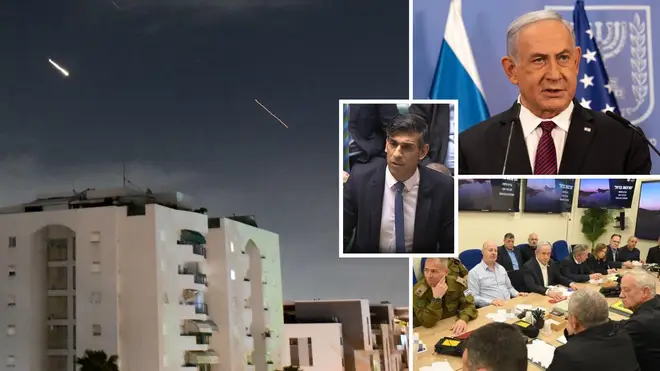
Israel is planning a ‘painful’ strike on Iran - despite Western calls for calm - after it was targeted in an unprecedented missile and drone attack over the weekend.
The Israeli Prime Minister Benjamin Netanyahu has reportedly asked the IDF to draw up a list of targets they could hit that the US would not object to.
Leaders across the Western world, including in the US and UK, have urged Israel to "take the win" after an "almost total failure" by Iran in its missile attack.
A 'careful' Israeli response could come in the form of a precision strike on a facility in Tehran, or a cyber attack, according to the Washington Post.
“Everybody agrees that Israel must respond,” an Israeli official told the publication. “How to respond, when to respond, is the question.”
It comes after Israel said Iran launched 170 drones, more than 30 cruise missiles and at least 120 ballistic missiles in an assault that set off air raid sirens across the country.
By Sunday morning, Tehran said the attack was over and Israel reopened its air space having said it had intercepted along with its allies 99% of the projectiles launched towards its territory.
Speaking to Lisa Aziz on LBC News, Lib Dem leader Sir Ed Davey said the UK needed to get involved to help halt further attacks.
Sir Ed said: "There is a real worry across the whole world now, that we could see a regional war which would spiral out of control, see huge numbers of deaths and have impacts across the Middle East and further afield too.
"So, the UK has a direct interest and it's the right thing to do to stop a cycle of attack, attack, attack."
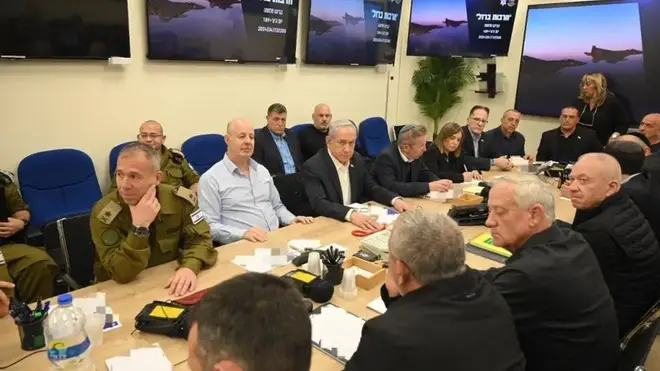
It comes after the former Defence Secretary Ben Wallace warned that Iran must be "hit back twice as hard" following the missile attacks from Tehran.
Mr Wallace said Iran is acting like a "bully" and called for the West to come “together to defeat their drones and missiles”.
But Rishi Sunak urged "all sides to show restraint", with both No10 and the White House concerned that retaliation will spark a wider conflict.
Read more: Israel must show it is 'prepared to go berserk' on Iran says security minister
Mr Wallace accused the government of doing “almost nothing in response” to Iran’s activity in the Middle East.
He called on leaders to stop treating Iran “like a child having a tantrum in a restaurant”.
“I have learnt, working against Britain’s adversaries, that the only way to deal with a bully is to retaliate," he wrote in the Telegraph.
“The only option when Iran and Russia hit, I have concluded, is to hit back twice as hard and not stop until they get the message.”

Ben Kentish debates caller over Israel-Iran
Speaking in the Commons on Monday, Rishi Sunak said Iran - "a despotic regime" - had "shown its true colours" and was "intent on sowing chaos in their own backyard".
The PM told MPs that the "fallout for regional security and the toll on Israeli citizens would have been catastrophic" if the attack had been successful.
Mr Sunak also warned that Iran's nuclear programme has "never been more advanced than it is today and threatens international peace and security".
He said the UK and other allies "want to see calmer heads prevail", adding that "we are directing all our diplomatic efforts to that end."
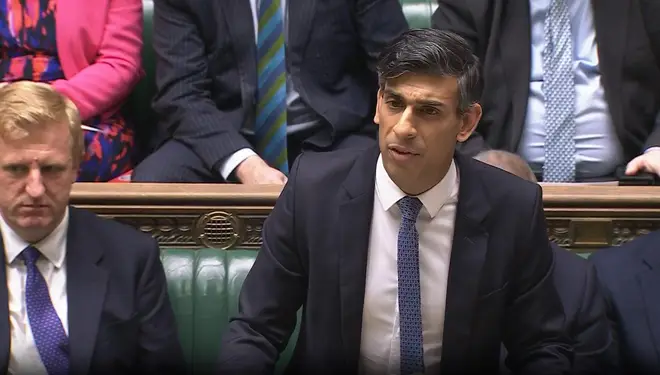
The assault came in response to a strike widely blamed on Israel on an Iranian consular building in Syria earlier this month, which killed two Iranian generals.
The IDF said that it would respond to the attack.
Chief of staff Lt. Gen. Herzi Halevi said: "Iran wanted to harm the strategic capabilities of the State of Israel — that is something that had not happened before.
"We were prepared for the ‘Iron Shield’ operation — preparation that brought Iran to also meet air superiority.
"Last Monday, we saw what was being organized, and we think that the State of Israel is very strong and knows how to deal with it alone, but with a threat so numerous and so far away, we are always happy to have [the United States] with us.
He added: "We are looking ahead, we are considering our steps, and this launch of so many missiles, cruise missiles, and UAVs into the territory of the State of Israel will be met with a response."

Watch again: David Cameron speaks to Nick Ferrari
The Prime Minister told the Commons that there were three key steps in returning the Middle East to peace.
"First we must uphold regional security against hostile actors including in the Red Sea, and we must ensure Israel's security - that is non-negotiable," he said. "It is a fundamental condition for peace in the region. In the face of threats like we saw this weekend, Israel has our full support.
"Second we must invest more deeply in the two state solution, that is what we have been doing over the past six months, including working closely with the Palestinian authority so that when the time comes they can provide more effective governance for Gaza and the West Bank.
"It is significant that other regional partners actually help to prevent a much worse attack over the weekend, it reminds us how important the attempts to normalise relations between Israel and its neighbours really are, and it holds out precious hope for the region.
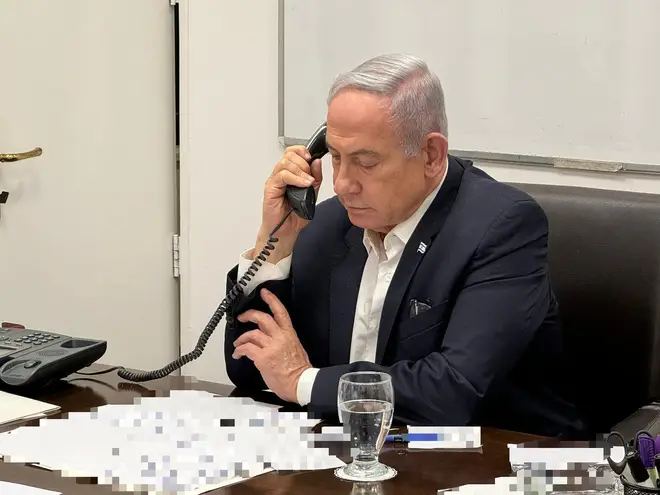
"Third, the conflict in Gaza must end, Hamas which is backed by Iran started this war, they wanted not just to kill and murder but to destabilise the whole region."
Mr Sunak also paid tribute to the three British aid workers who were among seven killed in an Israeli airstrike.
The PM said that Iran's attack was part of a growing trend of threats to global security.
He told MPs: "Saturday's attack was the act not of the people but of a despotic regime and it is emblematic of the dangers that we face today. The links between such regimes are growing: Tel Aviv was not the only target of Iranian drones on Saturday - Putin was also launching them at Kyiv."
He continued: "Who was the sole voice speaking up for Iran yesterday, seeking to justify their actions? Russia. The threats to stability are growing, not just in the Middle East but everywhere. and we are meeting those threats time after time with British forces at the forefront."
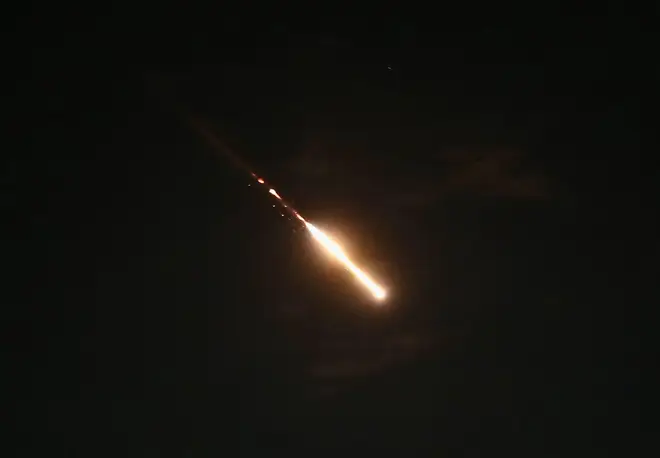
Labour and former Home Secretary Suella Braverman have both called for the government to proscribe Iran's Islamic Revolutionary Guard Corps (IRGC).
Ms Braverman called the IRGC "the world's chief sponsor of terrorism".
She asked Mr Sunak: "We have proscribed Hamas, we have proscribed Hezbollah. Prime minister, why don't we put the UK's national security first by now proscribing the IRGC?"
Mr Sunak said that he would not comment on "potential proscription decisions", adding that the government understands the threat that Iran poses, and has "taken measures to counter it at home and around the world".
His and Sir Keir's comments come after David Cameron, the Foreign Secretary, also pushed to de-escalate the conflict in the Middle East.
Lord Cameron told Nick Ferrari on LBC on Monday morning that Iran's attack was “almost a total failure".
"Iran has suffered a double defeat,” he said. "As Biden said, take the win and focus now on Hamas."